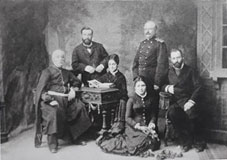
Iakob Zubalashvili - Country of Liquid Sun
Monday, April 27
Since ancient times, farmers in all of Georgia's regions have made chacha, fruit vodkas, extracts and bitter drinks based upon raw the materials of local provenance: in Kakheti - chacha, in Kartli - apple, peach, apricot plum, in Samtskhe-Javakheti - mulberry, chanchuri, cornel, in Guria - wax vodka (honeycomb), in Mtiuleti and Svaneti - zhipitauri, in Imereti – cherry plum, wild pear, in Khevi - beer.
Industrial production of spirit beverages in Georgia has been developing since the 1820s. In this regard, Iakob Zubalashvili (1792-1864), a famous Maecenas and entrepreneur, has made a special contribution.
The first great merchant from amongst the Catholic Zubalashvilis was Stepane, a prominent figure himself, who traded in Turkey, Iran, Middle Asia and India. He ultimately settled in India where he had several caravansaries, marrying a local woman and dying in India in 1815.
Beginning in the 1820s, Stepane's brother, Iakob Zubalashvili, began his activities-not by trading-but by the production of vodka in the city of Kutaisi. This is especially noteworthy because no manufacture existed in that enterprises, as such, did not exist in western Georgia at this time and neither were local Georgians skilled in trade, had not yet emerged as major traders.
Iakob Zubalashvili amassed a significant wealth through the production or vodka and, for the purpose of extending his activities, he also tried his luck in Tbilisi. In 1835-1836, on a land plot adjacent to the Didube German colony belonging gymnasium teacher, Mr Emerich, Zubalashvili opened a vodka distillery together with a foreign partner, Mr Watman. Initially intend ding to use wheat-based spirits for the production of his vodka, he opened the first sugar factory in the Caucasus in 1837 and used sugar remains for making the vodka. The opening of sugar factory was such an important event that Zubalashvili even received a significant privilege from the government-exemption from excise tax-and in return had to plant sugar cane plantations in Georgia worth the amount of the money saved. The income which was generated was immense. The only function of the factory was importing raw sugar from abroad and producing it into lump sugar. The factory existed for seven-to-eight years with its maximum annual income reaching 186,000 roubles.
Zubalashvili's vodka distillery in Tbilisi functioned successfully and at full capacity and remained profitable although a disagreement arose between Zubalashvili, Watman and Emerich in 1840-1842 in which Emerich threatened confiscation of the enterprise due to the non-payment of land rent and Zubalashvili blamed Watman for all the failures These circumstances led to the termination of production in 1842. In order not to leave the sugar remains unused, Zubalashvili, together with Pepinov, who lived in Tbilisi, opened a rum and vodka factory. Their product was of quite a high quality and so they tried to export it to Russia. For certain period of time, Pepinov, who was the factory's technologist, was asking for the government's permit to export 2,000 puds of rum to Russia without duty.
In 1843, Zubalashvili built a large caravansary in Tbilisi with ten shops storage facilities, wine cellars and 71 rooms for guests. He also built the church in Kutaisi, established pharmaceutical, construction and commercial companies, built schools in Javakheti and houses, churches, schools and bakeries in Tbilisi whilst taking care of the education of talented young people and initiating and implementing a great deal of good deeds.
After Iakob's death, his sons Anton and Konstantine developed their father's initiative even more, becoming acquainted with a new branch of industry in the form of oil extraction and purchased from Rotshield the island of Bibi-Eibat, near Bakum, in Caspian Sea.
In recognition of a lifetime of great service, Tbilisi awarded the title of Honourable Citizens to Levan, Stepane and Iakob Zubalashvili. In further homage to this family, one of the streets in the center of Tbilisi has been named Zubalashvili Brothers.




